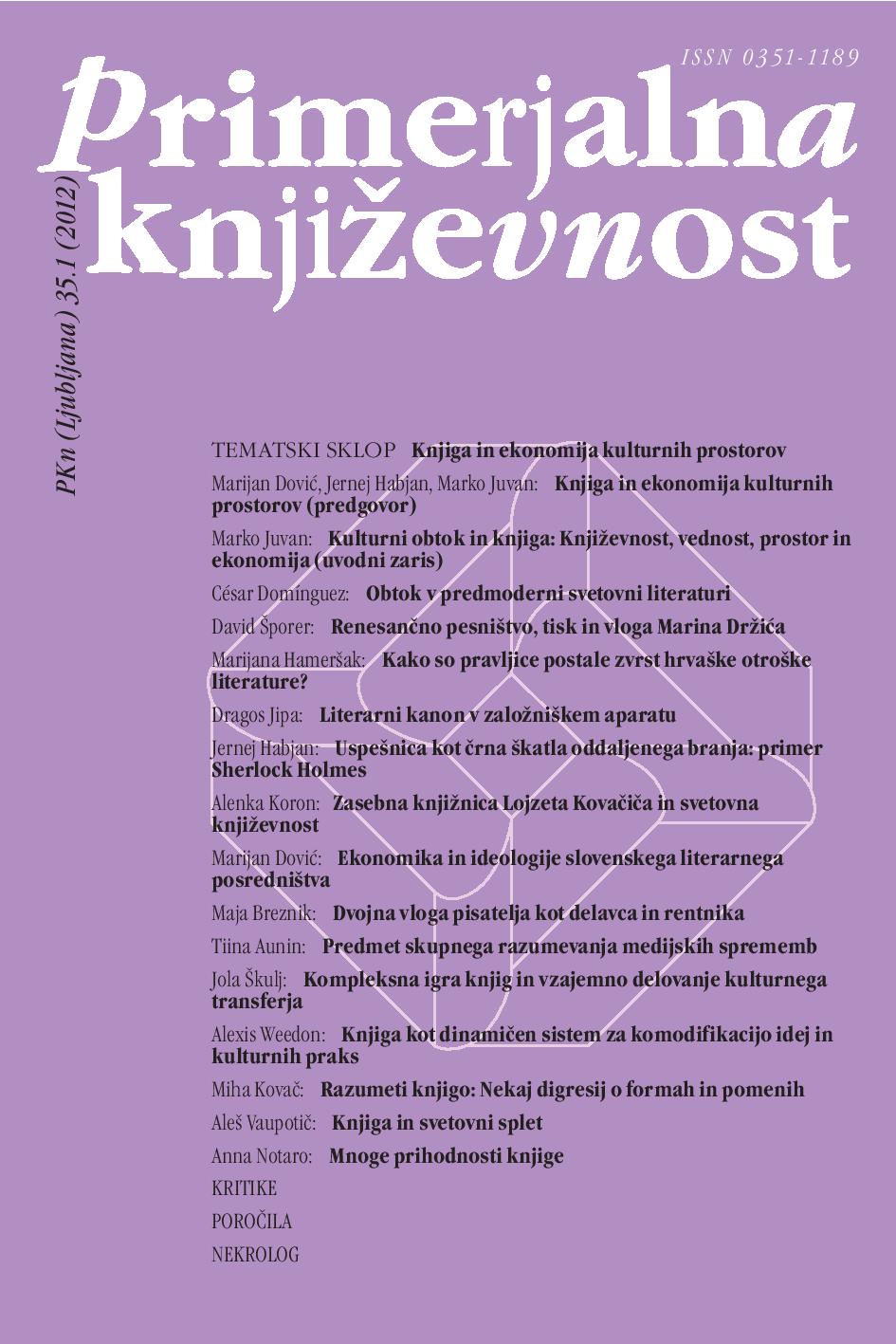Economics and Ideologies of Slovenian Literary Mediation
Keywords:
literature and society, Slovene literature, book library, literary mediation, book market, publishing, ideological mechanismsAbstract
This paper addresses the economics and ideologies that influenced Slovenian literary mediation in four very dissimilar historical periods of Slovenian book production and circulation: the Habsburg Monarchy (1779–1918), the interwar period (Royal Yugoslavia, 1918–1945), the communist period (Federal Yugoslavia, 1945–1991), and the democratic period (the Republic of Slovenia, from 1991). The analysis considers three groups of factors (or constraints) that condition the production and circulation of books (and ideas) in general: economic factors, political (ideological) factors, and networking factors. As a small system, Slovenian literature turns out to be special in many respects and only partly governed by market logic.References
Bourdieu, Pierre. The Rules of Art. Trans. Susan Emanuel. Stanford: Stanford University Press, 2000.
Chartier, Roger. Inscription and Erasure. Philadelphia: University of Pennsylvania Press, 2007.
Ciperle, Jože, and Andrej Vovko. Šolstvo na Slovenskem skozi stoletja. Ljubljana: Slovenski šolski muzej, 1987.
Dolinar, Darko. “Who Chooses and Who Offers Texts for Selection.” Primerjalna književnost 33.2 (2010): 227–42.
Dović, Marijan. Slovenski pisatelj. Ljubljana: ZRC SAZU, 2007.
– – –. “Totalitarian and Post-Totalitarian Censorship: From Hard to Soft?” Primerjalna književnost 31 (special issue, 2008): 167–78.
– – –. “The Editor and the Mediatory Function in a Literary System.” Primerjalna književnost 33.2 (2010): 213–25.
Gabrič, Aleš. “Censorship in Slovenia after World War II: From the Communist Index Librorum Prohibitorum to Abolition of the ‘Verbal Offence’.” Primerjalna književnost 31 (special issue, 2008): 221–36.
– – –. Slovenska agitpropovska kulturna politika 1945–1952. Ljubljana: Mladika, 1991.
Glas, Frank de. “Authors’ Oeuvres as the Backbone of Publishers’ Lists: Studying the Literary Publishing House After Bourdieu.” Poetics 25 (1998): 379–97.
Gregorin, Rok. Veleknjigarne v Sloveniji: mit ali resničnost? Ljubljana: UMco, 2006.
Grilc, Uroš. “Knjiga v presečišču javnega in zasebnega: primeri Francije, Finske, Hrvaške in Slovenije.” Knjižnica 50.4 (2006): 49–80.
Hroch, Miroslav. “From National Movement to the Fully-Formed Nation. The Nation-Building Process in Europe.” New Left Review 198 (1993): 3–20.
Janssen, Susanne. “Side-Roads to Success: The Effect of Sideline Activities on the Status of Writers.” Poetics 25.5 (1998): 265–80.
Juvan, Marko. “Peripherocentrismus: Geopolitics of Comparative Literatures Between Ethnocentrism and Cosmopolitanism.” Jean Bessière, Judit Maár (eds.). Histoire de la littérature et jeux d’échange entre centres et périphéries : les identités relatives des littératures. Paris: L’Harmattan, 2010. 53–63.
– – –. “Svetovni literarni sistem.” Primerjalna književnost 32. 2 (2009): 181–212.
Kovač, Miha. Skrivno življenje knjig. Ljubljana: Filozofska fakulteta, 1999.
Kovač, Miha, and Rüdiger Wischenbart. “A Myth Busted: Bestselling Fiction in Europe and Slovenia.” Primerjalna književnost 33.2 (2010): 287–306.
Leerssen, Joep. “Nationalism and the Cultivation of Culture.” Nations and Nationalism 12.4 (2006): 559–78.
Lessig, Lawrence. Free Culture. New York: Penguin Press, 2004.
Moravec, Dušan. Novi tokovi v slovenskem založništvu. Ljubljana: DZS, 1994.
Neubauer, John. “Publishing and Censorship. Introduction.” History of the Literary Cultures of East-Central Europe. Junctures and Disjunctures in the 19th and 20th Centuries. Volume 3. Ed. Marcel Cornis-Pope and John Neubauer. Amsterdam: John Benjamins, 2004. 39–61.
Nooy, Wouter de. “Social Networks and Classification in Literature.” Poetics 20.5–6 (1990): 507–37.
Rose, Mark. Authors and Owners: The Invention of Copyright. Cambridge (MA): Harvard University Press, 1993.
Rude-Porubská, Slávka. “Who Chooses Literature for Translation? Translation Subsidies in Germany.” Primerjalna književnost 33.2 (2010): 273–86.
Rugelj, Samo. Za vsako besedo cekin. Slovensko knjižno založništvo med državo in trgom. Ljubljana: Cankarjeva založba, 2010.
Sapiro, Gisèle. “The Literary Field Between the State and the Market.” Poetics 31.4–5 (2003): 441–64.
Schiffrin, André. The Business of Books. London: Verso, 2000.
Schmidt, Siegfried J. Grundriß der Empirischen Literaturwissenschaft. Braunschweig: Vieweg, 1980.
Schreier, Margrit. “‘Is it Possible to Give a 6 out of 5 Stars?’: Book Selection and Recommendation in the Internet Age.” Primerjalna književnost 33.2 (2010): 307–20.
Šlebinger, Janko (ed.). Publikacije Slovenske matice od leta 1864 do 1930. Ljubljana: Slovenska matica, 1930.
Slovenska knjiga. Seznam po stanju v prodaji dne 30. junija 1939. Ljubljana: Organizacija knjigarjev Dravske banovine, 1939.
Squires, Claire. Marketing Literature. London: Palgrave, 2007.
Statistični letopis Republike Slovenije 2011. Available at: http://www.stat.si/letopis (4 April 2012).
St Clair, William. “Following Up the Reading Nation.” The Cambridge History of the Book in Britain, Vol. 6, 1830–1914. Cambridge: Cambridge University Press, 2009. 704–35.
Trampuž, Miha. Avtorsko pravo. Ljubljana: Cankarjeva založba, 2000.
Vodopivec, Peter. Od Pohlinove slovnice do samostojne države. Ljubljana: Modrijan, 2006.
Wachtel, Andrew. “Creating a Canon of Contemporary Eastern European Literature in the US: An Editor’s Perspective.” Primerjalna književnost 33.2 (2010): 267–72.
Zaid, Gabriel. So Many Books. London: Sort of Books, 2004.


